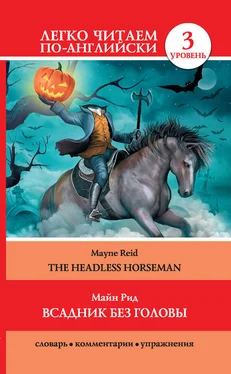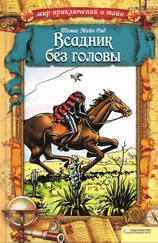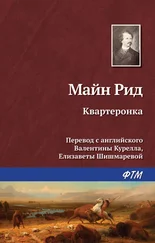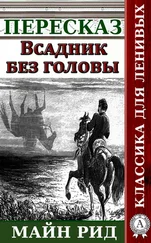The day before that appointed for the trial of the mustanger, a second presented himself at Fort Inge, who put forward his claim to be upon the side of the prisoner.
This gentleman had made a still longer journey than he of San Antonio; a voyage, in fact: since he had crossed the great Atlantic, starting from the metropolis of Ireland. He had come for no other purpose than to hold communication with the man accused of having committed a murder!
The Dublin solicitor was no little astonished when, after making inquiry about Maurice Gerald, he was told that the young Irishman was shut up in the guard-house.
The Irish lawyer was made welcome to go in and out of the military prison – as often as it seemed good to him. Some document he had laid before the eyes of the major-commandant, had procured him this privilege.
On the day after his arrival the trial was to take place; and during most of the interval he was either in the guard-house along with the prisoner, or closeted with the San Antonio counsel.
Only once had Zeb Stump been seen conferring with them. After that he was gone – both from the guard-house and the settlement, as everybody supposed, about his ordinary business – in search of deer, or gobbler.
It is true he was out upon a stalking expedition; but instead of birds or beasts, he was after an animal of neither sort; one that could not be classed with creatures either of the earth or the air – a horseman without a head!
***
Cassius Calhoun was alone in his chamber.
“It’s no use crying over spilt milk. She loves him – she loves him! She’s met the man, and there’s an end of it. She’ll never meet him again, and that’s another end of it – except she meet him in heaven. Well; that will depend upon herself. She shall never have him. A word from her, and he’s a hanged man.
“She shall speak it, if she doesn’t say that other word, I’ve twice asked her for. The third time will be the last. One more refusal, and I show my hand. Not only shall this Irish adventurer meet his doom; but she shall be his condemner; and the plantation, house, niggers, everything – Ah! uncle Woodley; I wanted to see you.”
The soliloquy was interrupted by Woodley Poindexter. Sad and silent, he had entered the apartment usually occupied by his nephew – more by chance than from any purpose.
“Want me! For what, nephew?”
There was a tone of humility, almost obeisance, in the speech of the broken man.
“I want to talk to you about Loo,” was the rejoinder of Calhoun.
It was the very subject Woodley Poindexter would have shunned. It was something he dreaded to think about.
“If I understand you aright, nephew, you mean marriage! Surely it is not the time to talk of it now – while death is in our house!”
It was evident the planter did not relish the proposed alliance.
This may seem strange. Up to a late period, he had been its advocate – in his own mind – and more than once, delicately, in the ear of his daughter.
It was only after the move into Texas, that the planter had a better opportunity of becoming acquainted with the true character of his nephew; and almost every day; since their arrival at Casa del Corvo, had this been developing itself to his discredit.
“You mistake me, uncle. I do not mean marriage – that is, not now. Only something that will secure it – when the proper time arrives. What I want to say is this. I’ve made up my mind to get married. I’m now close upon thirty – as you know; and I don’t intend to keep single any longer. I’m willing to have Loo for my wife. There need be no hurry about it. All I want now is her promise; signed and sealed, that there may be no uncertainty.”
“Well, nephew; you have certainly spoken plain enough. But I know not my daughter’s disposition towards you. You say you are willing to have her for your wife. Is she willing to have you? I suppose there is a question about that?”
“I think, uncle, it will depend a good deal upon yourself. You are her father. Surely you can convince her?”
“I’m not so sure of that. She’s not of the kind to be convinced – against her will. You, Cash, know that as well as I.”
“Well, I only know that I’d like Loo for the mistress of Casa del Corvo, better than any other woman in the Settlement – in all Texas, for that matter.”
Woodley Poindexter recoiled at the ungracious speech. It was the first time he had been told, that he was not the master of Casa del Corvo! Indirectly as the information had been conveyed, he understood it.
***
It was the third time Calhoun had been flatly refused; and the answer told it would be the last. It was a simple “No,” emphatically followed by the equally simple “Never!”
Calhoun listened to his rejection, without much show of surprise. Possibly – in all probability – he expected it.
But his features remained firm.
“You’re not in earnest, Loo?”
“I am, sir. Have I spoken like one who jests?”
“You’ve spoken like one, who hasn’t taken pains to reflect.”
“Upon what?”
“Many things.”
“Name them!”
“Well, for one – the way I love you.”
She made no rejoinder.
“A love,” he continued, in a tone half explanatory, half pleading; “a love, Loo, that no man can feel for a woman, and survive it. It is no use my telling you its history. It began on the same day – the same hour – I first saw you.
“On my first visit to your father’s house – now six years ago – you asked me to take a walk with you round the garden – while dinner was being got ready.
“You were a woman in beauty – as beautiful as you are at this moment.
“No doubt you little thought, as you took me by the hand, and led me along the gravelled walk, that the touch of your fingers was sending a thrill into my soul; your pretty prattle making an impression upon my heart, that neither time, nor distance, has been able to efface.”
Words so eloquent, so earnest, so full of sweet flattery, could scarce fail to have effect upon a woman. Still did the Creole keep silence.
Calhoun continued —
“From the hour you first caught hold of my hand I can remember no change, no degrees, in the fervour of my affection; except when jealousy has made me hate– I’ve been so jealous with you at times, that it was a task to control myself.”
“Alas, cousin, I cannot help what has happened. I never gave you cause, to think-”
“I know what you are going to say. I’ll say it for you: `to think that you ever loved me.’ Those were the words upon your lips.
“I don’t say you did,” he continued, with deepening despair: “I don’t accuse you of tempting me. Something did. God, who gave you such beauty; or the Devil, who led me to look upon it.”
“I must be frank with you, Cassius. I do not – I cannot, love you.”
“You will not marry me then?”
“That, at least, is an idle question. I’ve said I do not love you. Surely that is sufficient.”
“And I’ve said I love you. I gave it as one reason why I wish you for my wife: but there are others. Are you desirous of hearing them?”
“State them! What have I to fear?”
“I won’t say what you have; but what your father has.”
“I’m aware that my father’s in debt; and that you are his creditor. How could I have remained in ignorance of it? You are master of Casa del Corvo. I know it. You are not master of me!”
“Well; if I’m not master of your heart, I am of your happiness – or shall be. I know the worthless wretch that’s driven you to this denial—”
“Who?”
“How innocent you are!”
“Of that at least I am; unless by worthless wretch you mean yourself. In that sense I can understand you, sir. The description is too true to be mistaken.”
Читать дальше
Конец ознакомительного отрывка
Купить книгу








